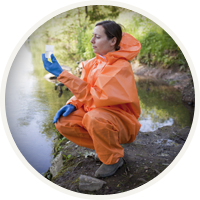
The word epidemiology comes from Greek and means "what is upon the people," though you could amend that to say "what is upon the people that makes them sick." Epidemiologists are disease detectives who investigate the causes of illnesses using data like blood samples, patient interviews, and surveys. They study the outbreaks you see on the news—think swine flu, anthrax, and whooping cough—and try to figure out what caused them and how to prevent recurrences. They also examine populations to try to determine a connection between a risk factor and a disease (we're looking at you, smoking and lung cancer). And some epidemiologists might survey several patients with the same disease and try to develop new medications or vaccines. No one likes to think about getting sick, but it's a good thing that epidemiologists do: It would be a serious drag if we still had to worry about coming down with preventable diseases like smallpox and polio.
The Details
Master's Degree
Epidemiologists keep the public healthy by (hopefully) stopping disease outbreaks in their tracks.
In ancient times, epidemics and plagues were thought to be caused by vengeful gods rather than unsanitary living conditions or public health problems.






